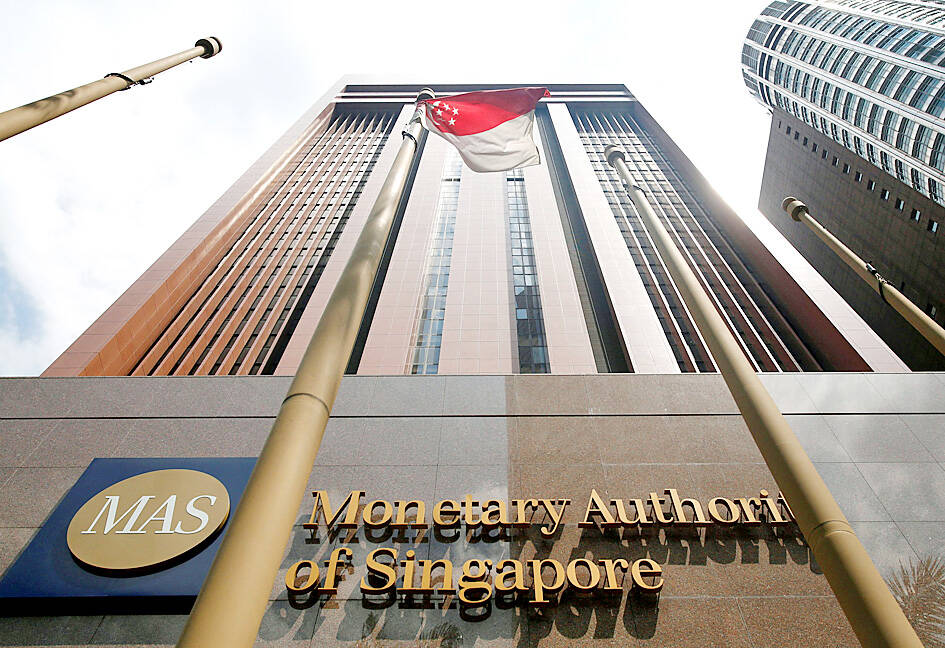Singapore’s central bank said a resurgence in global food and oil prices could increase pressure on monetary authorities globally to further tighten their policies.
“There are nascent supply-side sources of fresh price pressures” as oil skirts close to US$100 a barrel, the Monetary Authority of Singapore (MAS) said in its biannual macroeconomic review published yesterday.
There “remains a risk that adverse supply side shocks from extreme weather events, including a strong El Nino, and an escalation in geopolitical tensions, could lead to a surge in food and energy prices,” it said. “Upside inflation surprises could prompt further policy tightening or keep rates elevated for longer.”

Photo: Reuters
Indonesia and the Philippines delivered surprise interest rate hikes in the past few weeks, and signaled that they could do more to support their currencies and stem price risks. Other Asian central banks are expected to raise interest rates over the next six months, with a stronger US dollar and rising oil prices keeping countries from Australia to South Korea on a tightening path.
As for Singapore, which uses the exchange rate as its main policy tool and had kept settings unchanged earlier this month, MAS Managing Director Ravi Menon said the monetary policy “remains appropriately tight.”
The MAS would “maintain the prevailing rate of appreciation of the S$NEER policy band,” the central bank said in the report, recapping its Oct. 13 decision to keep the Singapore dollar’s nominal effective exchange rate on an appreciating path.
“There will be no change to its width and the level at which it is centered,” the report said.
The MAS, which tightened monetary policy five times in the past two years, is to announce its next decision in late January next year.
Traders see an average of 13 basis-point hikes in the Asia-Pacific region, excluding China, over the next six months, according to market implied policy rates.
While Asian economies have posted modest price gains relative to the West, they are “more vulnerable to volatility in food and energy prices and higher imported inflation” arising from a stronger dollar, MAS said in the report.
“Further moves yet by the US Federal Reserve, or another spike in market rates, could tip others into tightening again, too, from Korea to India,” HSBC Holdings PLC chief Asia economist Frederic Neumann said on Friday.

When an apartment comes up for rent in Germany’s big cities, hundreds of prospective tenants often queue down the street to view it, but the acute shortage of affordable housing is getting scant attention ahead of today’s snap general election. “Housing is one of the main problems for people, but nobody talks about it, nobody takes it seriously,” said Andreas Ibel, president of Build Europe, an association representing housing developers. Migration and the sluggish economy top the list of voters’ concerns, but analysts say housing policy fails to break through as returns on investment take time to register, making the

NOT TO WORRY: Some people are concerned funds might continue moving out of the country, but the central bank said financial account outflows are not unusual in Taiwan Taiwan’s outbound investments hit a new high last year due to investments made by contract chipmaker Taiwan Semiconductor Manufacturing Co (TSMC, 台積電) and other major manufacturers to boost global expansion, the central bank said on Thursday. The net increase in outbound investments last year reached a record US$21.05 billion, while the net increase in outbound investments by Taiwanese residents reached a record US$31.98 billion, central bank data showed. Chen Fei-wen (陳斐紋), deputy director of the central bank’s Department of Economic Research, said the increase was largely due to TSMC’s efforts to expand production in the US and Japan. Investments by Vanguard International

WARNING SHOT: The US president has threatened to impose 25 percent tariffs on all imported vehicles, and similar or higher duties on pharmaceuticals and semiconductors US President Donald Trump on Wednesday suggested that a trade deal with China was “possible” — a key target in the US leader’s tariffs policy. The US in 2020 had already agreed to “a great trade deal with China” and a new deal was “possible,” Trump said. Trump said he expected Chinese President Xi Jinping (習近平) to visit the US, without giving a timeline for his trip. Trump also said that he was talking to China about TikTok, as the US seeks to broker a sale of the popular app owned by Chinese firm ByteDance Ltd (字節跳動). Trump last week said that he had

STRUGGLING TO SURVIVE: The group is proposing a consortium of investors, with Tesla as the largest backer, and possibly a minority investment by Hon Hai Precision Nissan Motor Co shares jumped after the Financial Times reported that a high-level Japanese group has drawn up plans to seek investment from Elon Musk’s Tesla Inc to aid the struggling automaker. The group believes the electric vehicle (EV) maker is interested in acquiring Nissan’s plants in the US, the newspaper reported, citing people it did not identify. The proposal envisions a consortium of investors, with Tesla as the largest backer, but also includes the possibility of a minority investment by Hon Hai Precision Industry Co (鴻海精密) to prevent a full takeover by the Apple supplier, the report said. The group is